Religious Education
Our RE curriculum is aligned with the Doncaster Religious Education Agreed Syllabus and has 2 central aims:
1 To guide and support students in developing their understanding of religions/worldviews, exploring their commonality and diversity.
2 To empower students to develop and use critical thinking skills to avoid misunderstanding, stereotyping and division.
Curriculum Model
RE lessons are delivered solely through PD hour. This ensures that a wide range of beliefs can be considered and compared. It also allows students opportunities to revisit their prior learning before building upon it in their next lesson. Our curriculum road maps below give more detail as to which religion/world view students will study in each PD Hour lesson. The links to those can be found at the bottom of this page.

Mrs R Hancock
Curriculum Leader for RE
Curriculum Outline
Our curriculum is designed around 6 threads or ‘pathways’ through which the most important features of RE may be understood. The pathways can be thought of as big ideas or questions about life, belief and belonging. By organising the syllabus around these 6 pathways, our students develop substantive knowledge of specific religions and worldviews, along with the ability to compare and critically evaluate them.
The 6 pathways are:
Pathway 1: The Nature of Religion and Belief
Students learn that religions and worldviews are made up of connected beliefs, practices, and values. They are very different from one another and often change when new situations or challenges arise. These differences and changes can sometimes lead to disagreement or conflict, but they can also inspire new and creative ideas.
Pathway 2: Expressing Belief
Students learn that it can be hard to express deep beliefs, feelings, and religious experiences in everyday words. People often use figurative language or different writing styles to do this. They may also use art, music, drama, or dance to show or explain religious or non-religious ideas and experiences.
Pathway 3: A Good Life
Students learn that many people, whether religious or not, try to live a good life. Religious and non-religious groups often agree on the qualities and actions that make someone a good person and on what counts as right or wrong behaviour. These ideals are often shown through the lives of role models. However, people sometimes disagree—both within and between religions and worldviews—about how moral principles should be understood and applied.
Pathway 4: Personal Journey
Students learn that people have deep experiences that they may call religious, spiritual, or simply part of being human. These experiences can happen in both religious and non-religious settings and may create strong feelings of wonder, purpose, or belonging. Sometimes, these experiences are so powerful that they change a person’s life, their beliefs, or even inspire new religions or worldviews.
Pathway 5: Influence and Authority
Students learn that Religious and non-religious communities interact with the wider world and influence society. They shape traditions, laws, politics, festivals, values, and the arts. Their influence can look very different depending on the place and time. Some societies are mainly shaped by one religion or worldview, while others are influenced by many. These religions and worldviews often look to respected leaders or big ideas, which can have both positive and negative effects on society and culture.
Pathway 6: The Big Picture
Students learn that religions and worldviews provide comprehensive accounts of how and why the world is as it is. These accounts are sometimes called ‘grand narratives’. They seek to answer the big questions about the universe and the nature of humanity. These narratives are usually based on approaches to life, texts or traditions, which are taken to be authoritative. People interpret and understand these texts and traditions in different ways.
Curriculum Aims
Develop the character of all students:
Our RE curriculum enables learners to develop a broad and balanced understanding of religions and worldviews, including Christianity, other faiths, and non-religious beliefs.
Through this exploration, students come to understand how different worldviews are woven into human experience, influencing life choices, relationships, and moral decisions.
RE provides a safe yet challenging context in which learners can explore difficult or sensitive issues, developing moral resilience, empathy, and open-mindedness. It also supports students in discovering their own identity, values, and sense of purpose, fostering self-awareness and emotional maturity.
In this way, RE plays a significant role in developing the character, integrity, and compassion required to contribute positively to society.
Ensure all students are literate and numerate:
Our RE lessons nurture the critical thinking, reasoning, and communication skills that underpin literacy and numeracy development.
Through discussion, debate, and written reflection, pupils learn to articulate complex ideas clearly, analyse evidence, and construct coherent arguments.
By engaging with texts, teachings, and ethical dilemmas, RE enhances students’ ability to:
- Interpret and evaluate information, developing higher-order reading comprehension skills.
- Use structured reasoning to analyse religious and philosophical concepts, strengthening cognitive precision and logical thought.
- Apply evidence and justification, mirroring analytical approaches found in mathematics and the sciences.
Build Knowledge and Aspirations of All Students
Our RE curriculum encourages learners to enquire into fundamental human questions — about meaning, purpose, morality, and identity — building intellectual curiosity and aspiration.
It provides a rich knowledge base of religious traditions, worldviews, and philosophical perspectives, enabling pupils to understand how beliefs shape individuals, cultures, and societies.
The subject nurtures an awareness of the diversity of human belief and experience, fostering tolerance and respect for others. This broad understanding helps pupils to:
- Engage thoughtfully with global issues.
- Value different viewpoints.
- Aspire to contribute positively to an interconnected and diverse world.
Ensure all students have the secure foundations to progress into further education and employment:
RE contributes to the development of learners who are confident, reflective, and resilient, equipped with transferable skills that support future study and employment.
By engaging with real-world ethical and social issues, pupils learn to evaluate evidence, justify opinions, and approach problems with empathy and critical insight.
RE supports employability by:
- Strengthening communication and reasoning skills.
- Encouraging collaboration and respectful dialogue.
- Developing the ability to navigate diversity and engage constructively with difference — essential for modern workplaces.
Ultimately, RE prepares pupils to be lifelong learners and active citizens, able to apply their understanding to both professional and personal contexts.
Develop cultural capital of all students:
RE provides a rich platform for developing pupils’ spiritual, moral, social, and cultural understanding, broadening their horizons beyond their immediate experiences.
By engaging with a variety of religious, philosophical, and cultural traditions, pupils gain the knowledge and empathy needed to navigate and contribute to an increasingly diverse society.
RE enhances cultural capital through:
- Developing awareness of global beliefs, practices, and values.
- Encouraging curiosity about human experience and creativity.
- Supporting reflection on personal identity and belonging.
- Promoting a sense of shared humanity and global responsibility.
In doing so, RE empowers learners to participate meaningfully in their communities and the wider world, with a well-informed appreciation of both diversity and commonality.
How Parents Can Support Their Child’s Learning in Religious Education (RE):
- Encourage open discussion at home about moral or ethical issues in the news. This will help your child to apply classroom learning to real-world situations.
- Support wider reading and curiosity by exploring reputable sources (e.g., BBC Bitesize RE, documentaries, podcasts, or museum visits) that deepen understanding of different faiths, philosophies, and worldviews.
- Promote respectful dialogue by modelling how to listen to and appreciate diverse opinions, building empathy and critical thinking — key skills assessed in RE.
|
Curriculum Road Maps
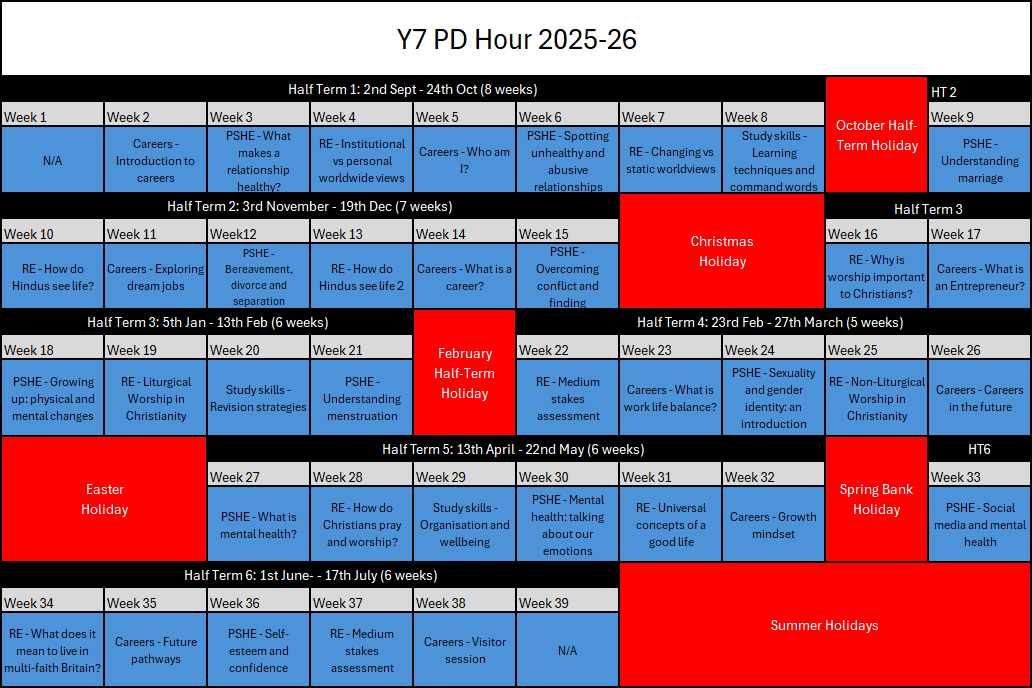 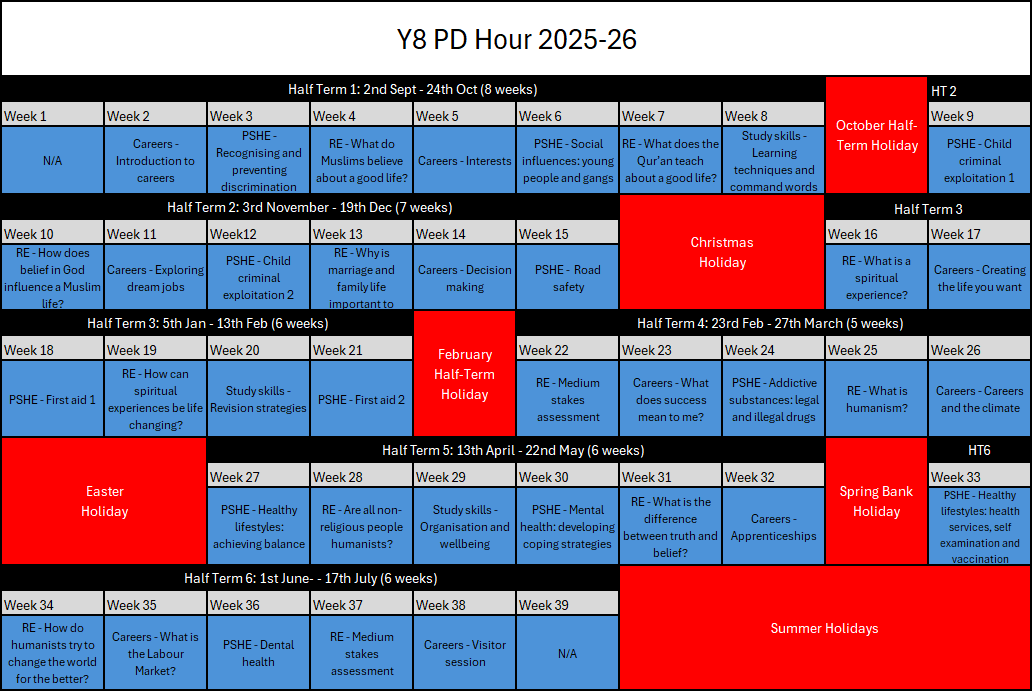 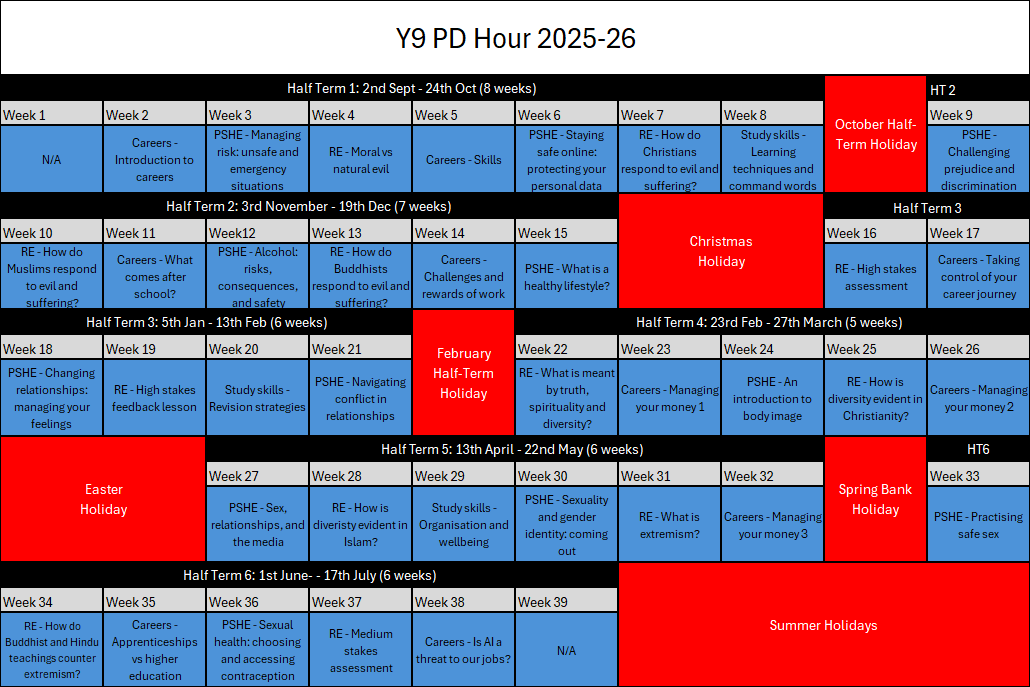 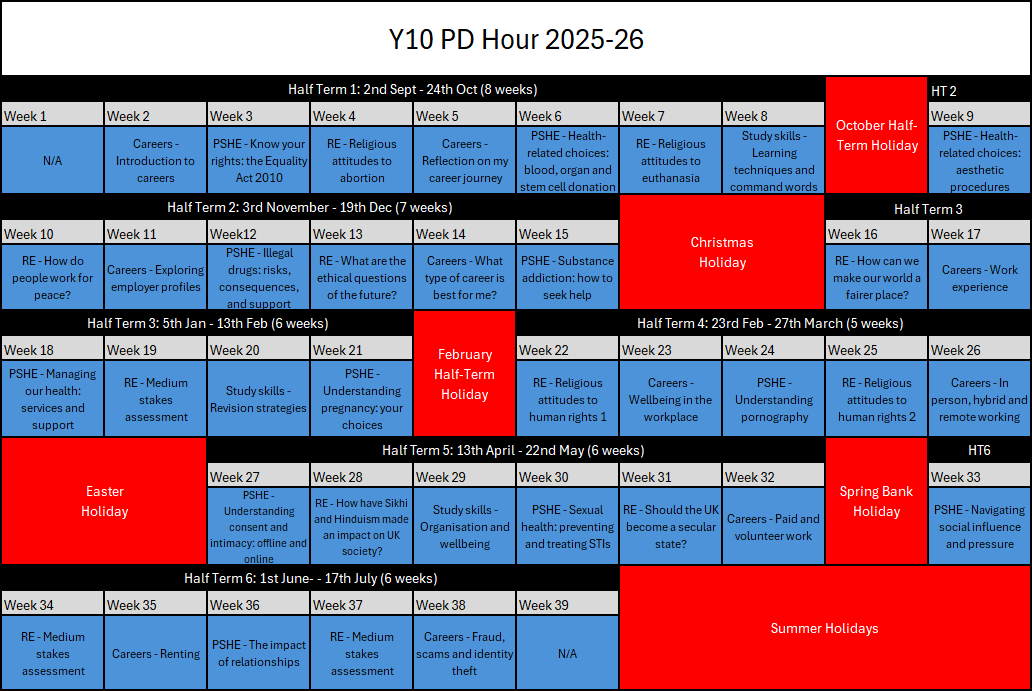 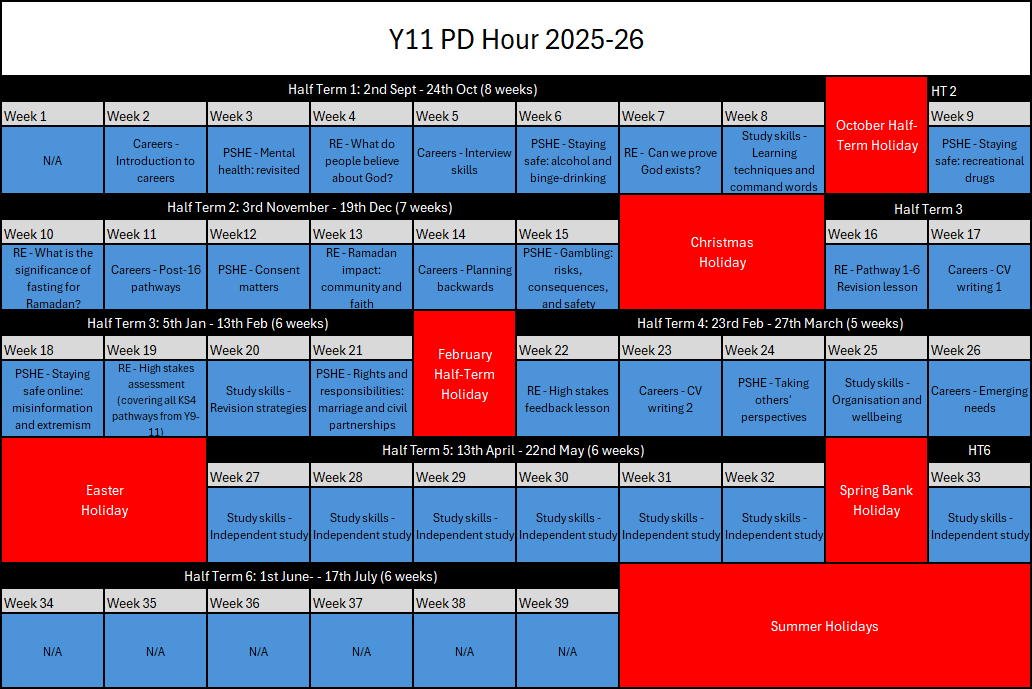 |

